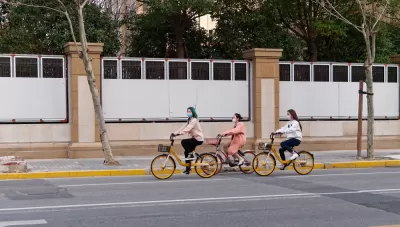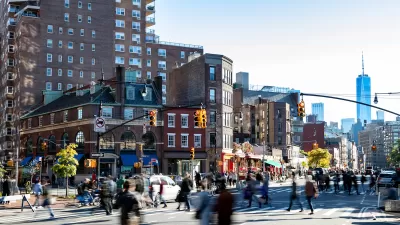Access (the ease of reaching desired destinations) is a key factor in transport, sustainability, and urban planning. This new study applies multimodal accessibility analysis to 4 modes in 117 cities in 6 countries, illustrated graphically.

From the abstract for new research published in NPJ Urban Sustainability on May 27 and available for open access:
Access (the ease of reaching valued destinations) underpins land use and transport infrastructure planning. The importance of access in transport, sustainability, and urban economics is increasingly recognized. In particular, access provides a universal unit of measurement to examine cities for the efficiency of transport and land use systems. This paper examines the relationship between population-weighted access and metropolitan population in global metropolitan areas (cities) using 30-minute cumulative access to jobs for 4 different modes of transport; 117 cities from 16 countries and 6 continents are included. The results indicate that sprawling development with intensive road network in American cities produces modest automobile access relative to their sizes, but American cities lag behind globally in transit and walking access; Australian and Canadian cities have lower automobile access, but better transit access than American cities; combining compact development with an intensive network produces the highest access in Chinese and European cities for their sizes. Hence density and mobility co-produce better access. This study finds access to jobs increases with populations sublinearly, so doubling metropolitan population results in a less than double access to jobs. The relationship between population and access characterizes regions, countries and cities, and significant similarities exist between cities from the same country.

FULL STORY: Urban Access Across the Globe: An International Comparison of Different Transport Modes

Trump Administration Could Effectively End Housing Voucher Program
Federal officials are eyeing major cuts to the Section 8 program that helps millions of low-income households pay rent.

Planetizen Federal Action Tracker
A weekly monitor of how Trump’s orders and actions are impacting planners and planning in America.

Ken Jennings Launches Transit Web Series
The Jeopardy champ wants you to ride public transit.

California Invests Additional $5M in Electric School Buses
The state wants to electrify all of its school bus fleets by 2035.

Austin Launches $2M Homelessness Prevention Fund
A new grant program from the city’s Homeless Strategy Office will fund rental assistance and supportive services.

Alabama School Forestry Initiative Brings Trees to Schoolyards
Trees can improve physical and mental health for students and commnity members.
Urban Design for Planners 1: Software Tools
This six-course series explores essential urban design concepts using open source software and equips planners with the tools they need to participate fully in the urban design process.
Planning for Universal Design
Learn the tools for implementing Universal Design in planning regulations.
Ada County Highway District
Clanton & Associates, Inc.
Jessamine County Fiscal Court
Institute for Housing and Urban Development Studies (IHS)
City of Grandview
Harvard GSD Executive Education
Toledo-Lucas County Plan Commissions
Salt Lake City
NYU Wagner Graduate School of Public Service





























